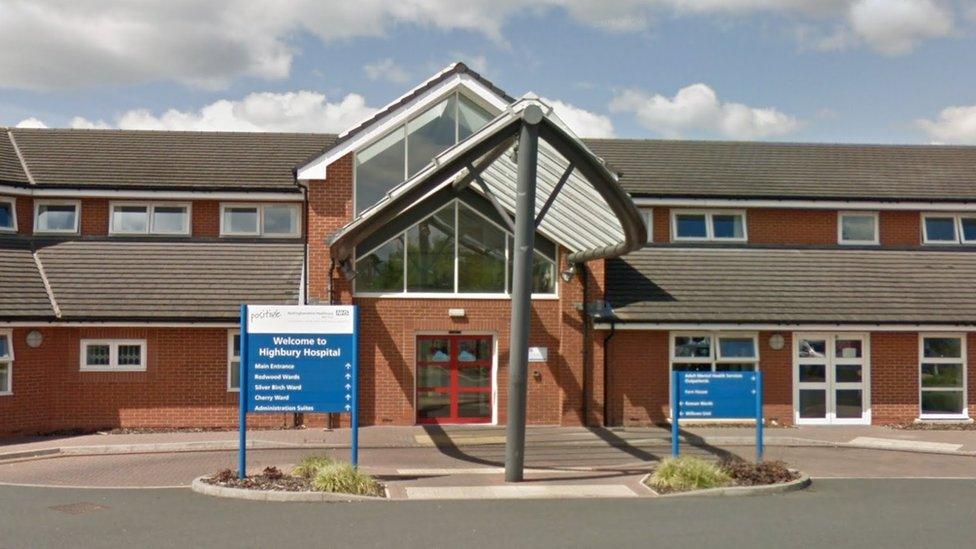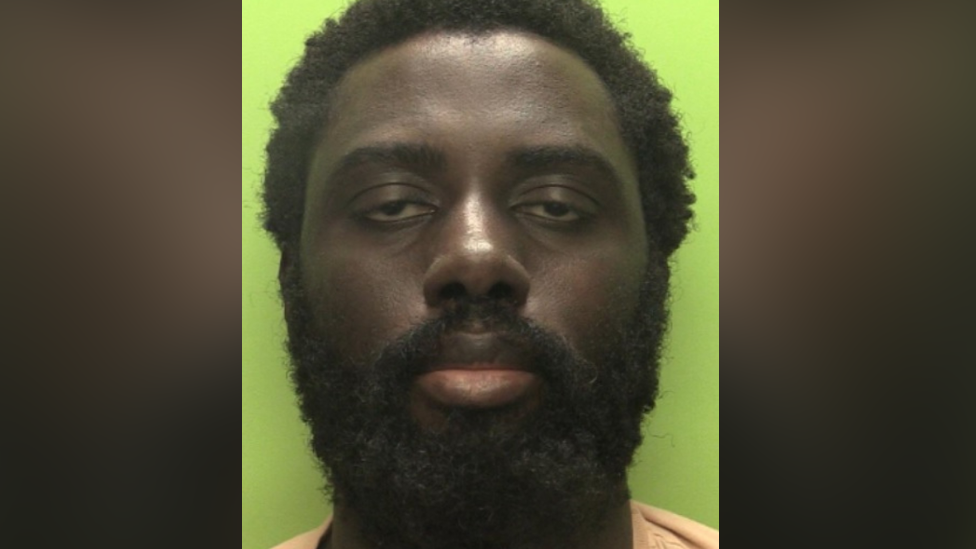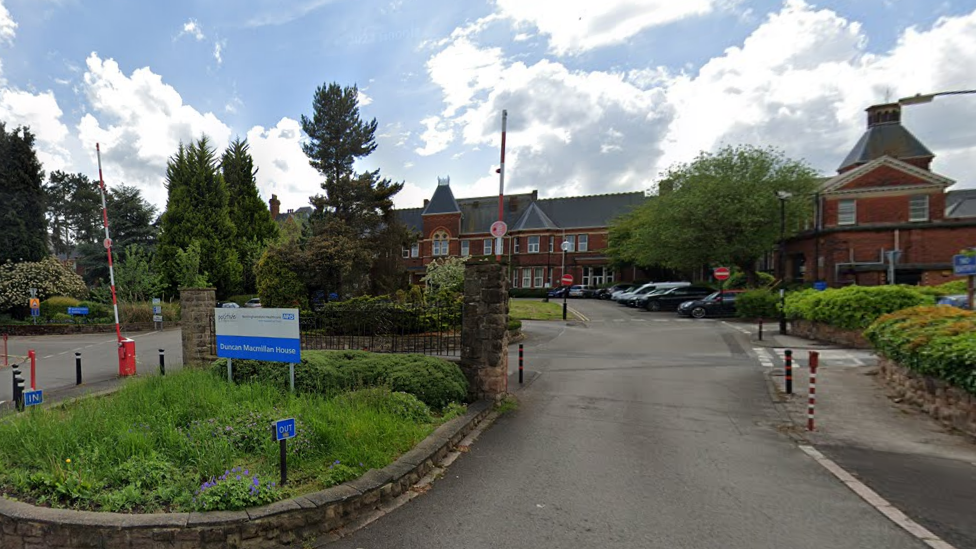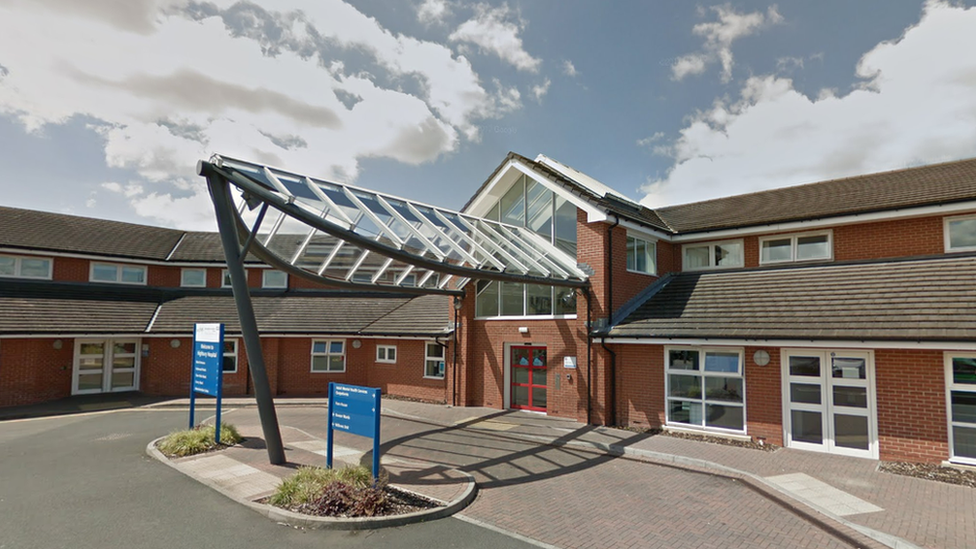Nottingham hospital staff falsified records on patient who died
- Published

Steven Parkin was "failed at every level" at Highbury Hospital, an inquest jury found
Multiple mental health hospital staff members falsified records during the care of a vulnerable man who later died, an inquest has heard.
Steven Parkin, 52, had a "potential mental health relapse" on 7 March 2022, resulting in his detention at Highbury Hospital in Nottingham.
Mr Parkin's condition got worse and 11 days later, he had a cardiac arrest.
An inquest jury found his death was contributed to by neglect, adding he was "failed at every level".
Nottinghamshire Healthcare NHS Foundation Trust, which runs the facility, said it was "so very sorry" over the care it gave to Mr Parkin.
Nottingham Coroner's Court heard Mr Parkin had a history of "schizoaffective disorder, asthma, ischemic heart disease, pre diabetes and frontal lobe atrophy".
On 7 March, he was assessed after concerns were raised over the potential relapse, and then placed at the mental health hospital in Bulwell.
During his first days, Mr Parkin was seen by several staff members who noted his "hoarse voice", with a blood test, which was requested by a consultant on 8 March, not carried out as it was not assigned.
Mr Parkin's oxygen saturation level was found to be as low as 88%, which the inquest heard should have triggered a doctor review and more frequent observations, neither of which happened.
Levels this low - the jury said - are also considered a medical emergency, requiring "transfer to A&E for examination, treatment and the administering of oxygen", but nurses failed to escalate these scores to doctors.
Mr Parkin was later moved to another ward and under the care of a multi-disciplinary team (MDT) of consultants, doctors, nurses and healthcare assistants.
'Multiple missed opportunities'
At each of the meetings, Mr Parkin's physical health condition was not discussed or recorded, including the "dangerously low" oxygen levels.
On 16 March, nurses reported Mr Parkin had "red swollen legs", with a doctor saying the most likely cause was heart failure.
The inquest heard Mr Parkin was prescribed "intermittent" mental health observations, meaning he was to be observed - with observations not more than 10 minutes apart.
Staff failed to complete 17 of these observations in the hours before Mr Parkin's death, the jury found.
CCTV showed staff using an iPad to log checks as complete, "despite being nowhere near [Mr Parkin] at the time".
"Multiple members of staff falsified medical records by logging these observations as being completed, with long periods where [Mr Parkin] as a vulnerable patient, was left alone unchecked," the jury said.
Mr Parkin went into cardiac arrest in the early hours of 18 March and was taken to the Queen's Medical Centre in Nottingham, where he later died.
His cause of death was found to be pneumonia with a background of heart failure.
In its conclusion, the jury said there were "multiple missed opportunities", all of which would have "prevented deterioration, allowed treatment and would have prevented [Mr Parkin's] death at this time".
The jury added: "If at any point before going into cardiac arrest he had been transferred to hospital for emergency treatment, he would likely have lived longer than he did.
"[Mr Parkin] was failed at every level, on every day he was an inpatient at Highbury, due to lack of responsibility, lack of effective management, poor communication, and failure to complete basic physical and mental health observations according to policy and patient safety."

The trust is also being reviewed over its treatment of triple killer Valdo Calocane
Ifti Majid, chief executive of the Nottinghamshire Healthcare NHS Foundation Trust, said improvements had been made since Mr Parkin's death including additional training, new medical monitoring devices and recruiting staff.
Mr Majid said: "I once again offer our sincere condolences and apologies to Steven's wife, family and friends.
"We are so very sorry that the care provided to Steven was not of the quality it should have been.
"We are determined to improve the experience of patients and their families and will continue to learn from this and work to make things better."
Earlier this month, the trust was ordered to make urgent improvements after inspectors uncovered a series of safety failings.
The Care Quality Commission (CQC) found examples of staff falsifying records and assaulting patients, including at Highbury, after an inspection last year.
The trust said it had implemented a number of changes since the inspections, including enhanced daily checks on records of patients' leave, a review of all observations and increased medicines management training.
It was also reported in January that more than 30 members of staff from across the organisation had been suspended amid an investigation into conduct.
At the time, the trust said it would investigate "fully and fairly".
The health secretary also commissioned the CQC to conduct a rapid review into mental health services provided by the trust following the sentencing of triple killer Valdo Calocane.
The review will investigate the trust's contact with him prior to the Nottingham attacks in June last year.

Follow BBC East Midlands on Facebook, external, on X, external, or on Instagram, external. Send your story ideas to eastmidsnews@bbc.co.uk, external or via WhatsApp, external on 0808 100 2210.
Related topics
- Published1 March 2024

- Published24 January 2024

- Published23 January 2024
